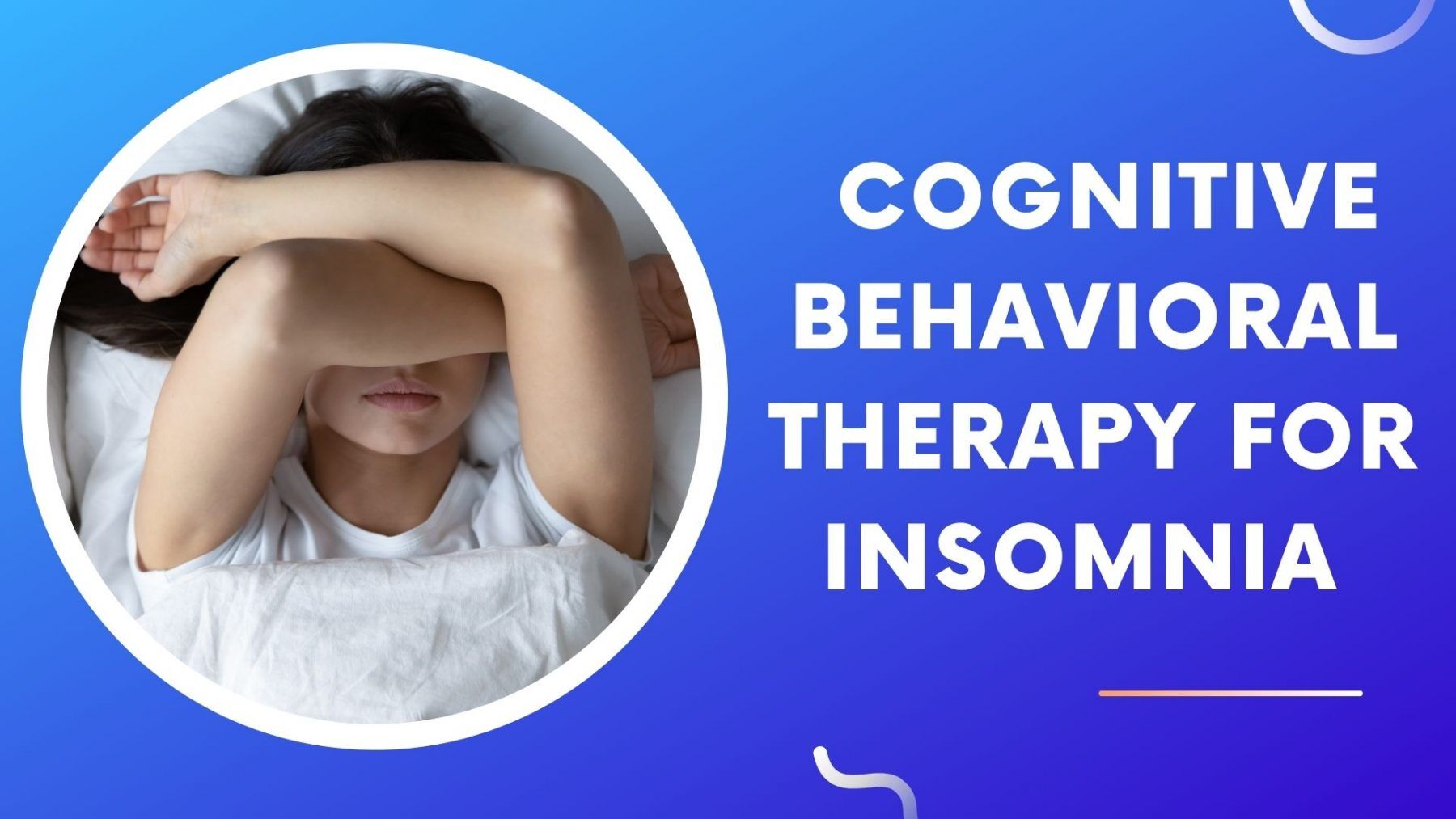Cognitive Behavioral Therapy for insomnia changes how people think about sleep and wakefulness.
This type of therapy helps you get more sleep because you develop healthier habits such as:
- sleeping at the same time every night
- going to bed only when you are sleepy
- not watching TV or using electronics before bed
What Is Insomnia?
Insomnia is a disorder that causes people to have trouble sleeping.
It can be short-term or long-term, and it may happen once in a while (episodic) or every night for months at time (chronic).
Insomniacs often feel tired during the day because they are not getting enough sleep.
Insomnia affects many people too. It is the most common sleep disorder in adults.
About one-third of people have insomnia at some point during their lives. About 15% to 20 % experience it long term.
Many things cause insomnia and difficulty falling asleep:
- stress
- anxiety disorders such as generalized or social phobia
- depression
- pain conditions that disrupt restful slumber, like restless leg syndrome.
Insomnia may also occur when a person’s body clock gets out of sync with his/her daily schedule.
Have you ever been traveling across time zones for work purposes – jet lag!
If you work the night shift then you can definitely relate! You’re working while others are asleep. Then you’re tired and going to bed when others are waking up!
The problem usually goes away on its own after a while. However, people with chronic insomnia need professional help from psychologists specializing in Cognitive Behavioral Therapy techniques.
How Does Cognitive Behavioral Therapy for Insomnia Work?
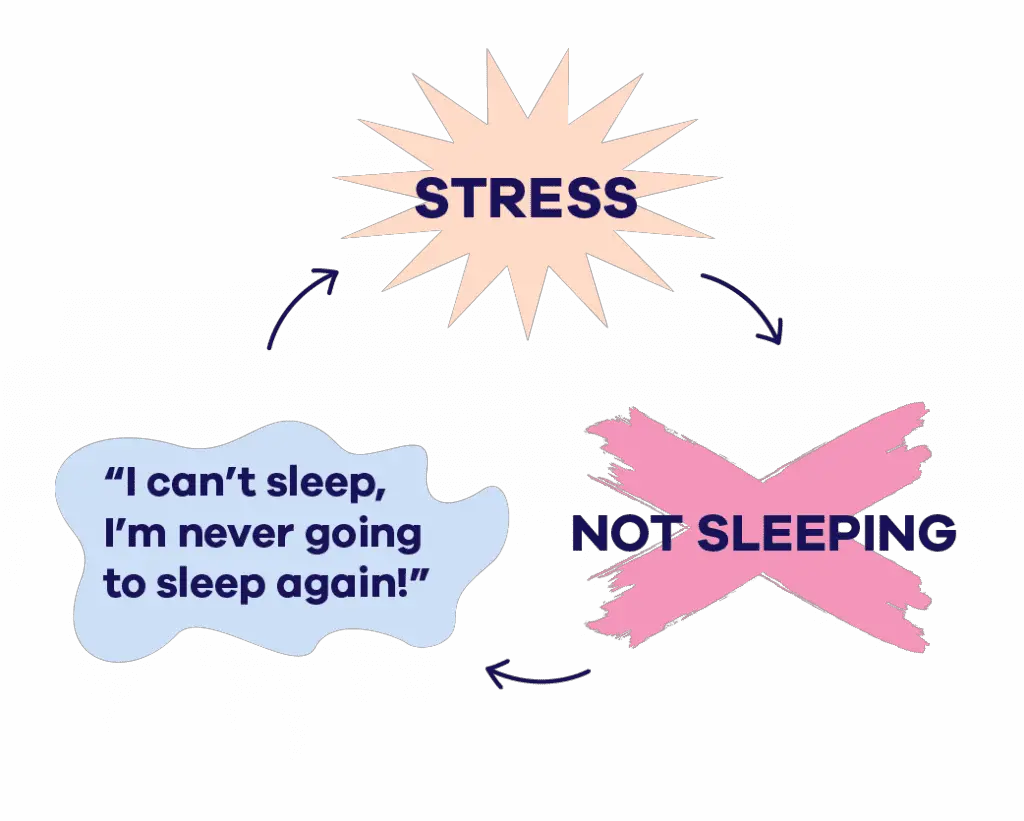
The first step in all types of Cognitive Behavioral Therapy (CBT) is awareness. You must identify any negative thoughts or behaviors keeping you awake at night, such as:
- worrying too much
- being overly anxious before bedtime (e-g., “What if I can’t fall asleep?”)
- having trouble getting comfortable to get some restful slumber – tossing & turning all over!
These are just examples but there could also be other reasons why one might not have an easy time sleeping, like pain conditions disrupting good quality snoozing, etc.
Most Important Reason Why Cognitive Behavioral Therapy For Insomnia Works
Cognitive Behavioral Therapy for insomnia works because you track your sleep routines.
Sometimes people watch their sleep routines using a diary, other times an app.
But whether you use a diary or an app, the key is bringing more awareness to your sleep routines. Bringing awareness to your sleep routines is the key to changing them.
Why is awareness so important? Well, as the old saying goes, ‘what gets measured, gets managed’.
Here’s an example. Take a look at my sleep for the past year. You can see that once I began tracking, my sleep scores went up!
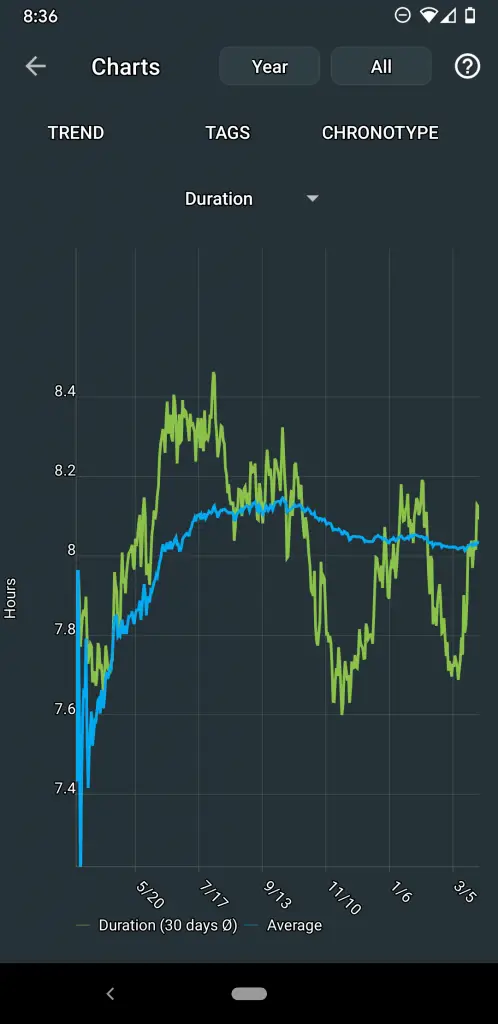
My sleep went from around 7 hours a night to over 8 hours! How did I change my sleep patterns?
My secret to success was recording my sleep. There is magic to recording when you fall asleep and what time you wake up. It’s like sleeping becomes a game.
When I don’t get a good night’s sleep, I see my score go down. When I get a good night’s sleep I see my score go up.
For me, I use the android app called Sleep. This app is good because it also tracks the quality of your sleep too.
The key is ‘seeing’ your sleep patterns. By recording on the app Sleep, you see your patterns.
The act of seeing something instead of thinking in your head can help you shift your sleep patterns.
While the Sleep app doesn’t mention Cognitive Behavioral Therapy, I can clearly see the similarities!
Of course you can use a written sleep diary to track your progress too. No app needed!
How To Keep A Sleep Diary To Overcome Insomnia
In the most basic form, a sleep diary is writing down what time you go to bed and when you wake up.
This is a cornerstone technique of Cognitive Behavioral Therapy for insomnia.
But there’s more! To overcome insomnia you’ll need more information than when you go to bed and wake up.
You’ll need to dig deep and explore your habits and mental processes.
Here are some examples of how you can explore your habits around sleep to overcome insomnia.
- Write down the time you went to bed and woke up
- Record how many hours of sleep
- Record sleep quality (good or bad) on a scale from 1 through 5, with good being 4s/5s
- Note any interruptions at once, such as waking during the night for more than 30 minutes, because this can affect your ability to get back into deep REM cycles. REM cycles are key in feeling restful when you wake up.
- Note what activities you did before going asleep: TV show watched? Any reading material that might have stimulated your brain too much so it was hard falling off?
- Did anything happen right after dinner like an argument about politics?
- Were there thoughts racing around my head preventing relaxation?
- Note what you did when you got out of bed?
Awareness Is The First Key To Overcome Insomnia – But What Then?
If you don’t know your sleep patterns then you won’t be able to overcome chronic insomnia or bad sleep habits.
Imagine trying to get sleep but not realizing you watch political shows at midnight and get all fired up with negative thoughts!
No matter how many lullabies you listened to, you’d never fall asleep afterwards! Your sleep hygiene is terrible!
Instead, you must realize awareness is the first step. But the next step is actually doing something about it!
Once you become aware of bad sleep habits, then you can start doing little experiments.
For example, say your sleep is worse when your room temperature drops below 68 degrees. Then do a little experiment and try turning up or down a thermostat!
If your sleep gets better at 70 but you still aren’t getting enough sleep then do another experiment!
Try turning off all electronics an hour before bedtime to see what happens!
First, Improve Your Sleeping Environment
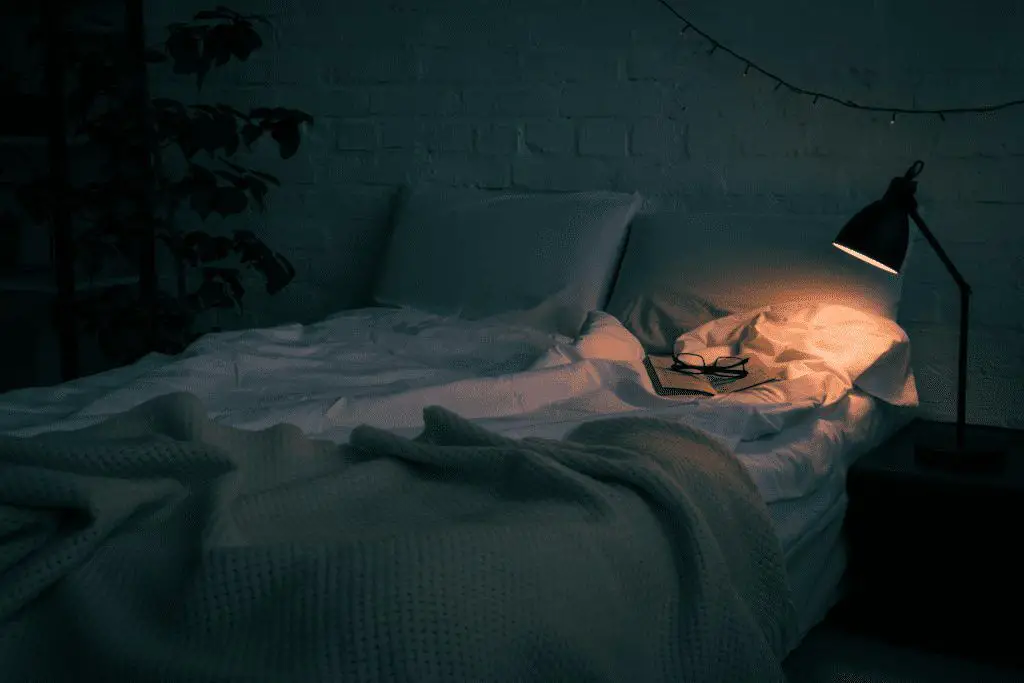
Here are some tips to improve your sleep environment:
- Keep the temperature between 68 and 70 degrees Fahrenheit
- Keep your room dark or use an eye patch (I wear a black beanie which I pull down over my eyes)
- Silence or background music
- Avoid caffeine after noon and alcohol before bedtime, or both if you can’t sleep at all without them!
Caffeine is a stimulant that will keep your brain awake for hours while it metabolizes in your body.
Avoid drinking coffee past 12 pm. This can help with quality rest time, leading to less tossing around during REM cycles.
Alcohol also disrupts deep stages of sleep where most dreaming occurs. Too much alcohol also will make you feel groggy upon waking up instead of feeling refreshed.
Stimulus Control Method
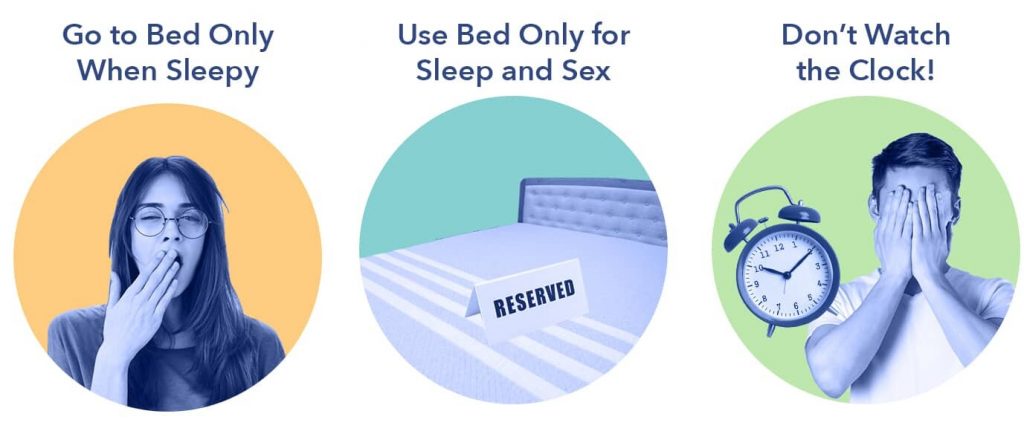
Research studies have shown that the Stimulus Control Method is effective for sleep disorders.
The Stimulus Control Method helps people learn how their bodies react when they go into bed.
(While this method is not specifically CBT, the technique relies on experimenting which is very similar to CBT)
The idea behind this method starts by limiting what you do before bed, like watching TV shows on Netflix.
These activities stimulate your brain, which makes you more alert than tired. Isn’t that the definition of insomnia!?
The next step is to go into bed when you are sleepy and not because it’s time for sleep. This can mean spending less time in bed than you’re accustomed to.
Some sleep restriction is important in the beginning to help you overcome chronic insomnia.
Finally, the last part involves leaving your bedroom if you’re unable to fall asleep after 20 minutes or so. This is another aspect of sleep restriction.
This will help teach your body that you need more rest before waking up again.
This helps you feel less tired throughout the day. with better quality deep slumber at night.
For more info on Stimulus Control Methods for insomnia, check out this Stanford article about stimulus control and cognitive behavioral therapy.
Learn Relaxation Techniques (After You Improve Your Sleeping Environment)
Changing your sleeping environment is the low hanging fruit. After you change your sleeping environment, you can start focusing on the relaxation side of things.
Here are some ways you can relax your body before falling asleep at night:
- Take a hot bath before bed. This will help you relax and unwind your muscles, which can make it easier to fall asleep at night!
- If possible, try not to eat anything within an hour prior going into the bedroom. This can help with digestion.
Progressive Muscle Relaxation
Progressive muscle relaxation is where you tense and then release a group of muscles. This technique is not limited to Cognitive Behavioral Therapy and is very effective.
I’m talking about tensing and then relaxing your neck and shoulders! This relaxation training can help you relax the entire body system before bedtime!
This is a great way for people with high levels of anxiety, stress or a sleep disorder. You can gain a feeling of control and feel more calm when you are trying to fall asleep at night.
If this doesn’t work try practicing yoga. Yoga is also helpful if you can’t sleep due to physical discomfort such as back pain.
Of course yoga may not always provide instant relief. But over a long period, you’ll feel less stressed out by your body.
Combine Everything To Overcome Insomnia!
I used to struggle for hours before falling to bed.
I never woke up much during the night but falling asleep and not getting enough sleep were big problems for me.
Using all the techniques above, I’m getting much better sleep now!
- I use a black beanie to cover light
- No coffee after 4pm
- Room is around 70 degrees
- Quiet
- I am not so good at the electronic part but I do try to relax an hour before bedtime!
- I record my sleep almost every day
- If I can’t fall asleep I get out of bed and come back once I’m tired
Who Can Benefit From Cognitive Behavioral Therapy for Insomnia?
Cognitive Behavioral Therapy For Insomnia is not a one size only approach.
It’s helpful for people who have chronic insomnia, but it can also help with anxiety and depression as well!
If you’re struggling in these areas or want better sleep, CBT may work great too. 🙂
The best part about Cognitive Behavioral Therapy for insomnia is you don’t need sleep medicine!
Of course sleeping pills can play a role in overcoming insomnia. But hopefully you can improve your sleep hygiene and avoid becoming dependent on sleeping pills!
Overall the lessons you’ll learn in CBT will change your life.
You’ll take better care of yourself and will get better sleep.
You’ll be more confident in life as you learn those anxious thoughts of yours are 99% of the time not important!
As these thoughts decrease sleep will improve and your life as well.


